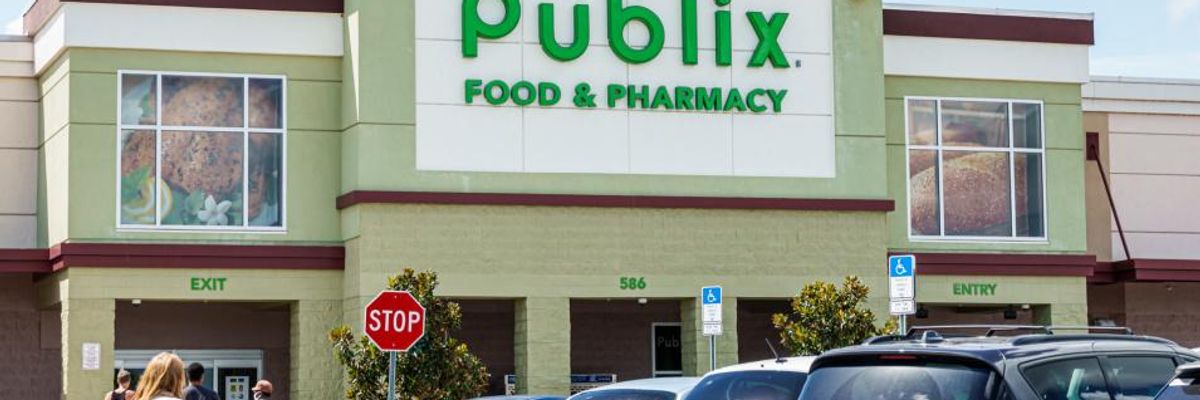With one-time $1,200 direct payments provided by Congress earlier this year long gone and the Republican Party refusing to renew enhanced unemployment benefits, which were shown to reduce poverty for several months, evidence is mounting that more people in the U.S. are being forced to steal food and other necessities as economic suffering mounts.
As the Washington Postreported Thursday, nearly 26 million Americans, or one in eight, reported not having sufficient food last month. The coronavirus pandemic has forced millions of people to turn to food banks for the first time in their lives, but now that the federal government has allowed the Farmers to Families food box program to begin running out of money a month ahead of its expiration date, even those who have been able to rely on aid are likely to face even more desperate circumstances.
"The United States military is active in over 100 countries but our people are reduced to shoplifting food, raising money for rent and medicine via online fundraisers, and thousands die every single day because our government refuses to help during a generational pandemic."
--Jared Yates Sexton, author of American Rule
The Loss Prevention Research Council told the Post that the prevalence of shoplifting food, diapers, baby formula, and other necessities appears to be even greater now than it was just after other national crises, like the 2008 recession when shoplifting rose 34%.
"We believe there is some increase in people who, because of Covid-19, are not able to pay for the items," Read Hayes, director of the council, told the Post.
The increase comes as an estimated 54 million Americans are estimated to have faced food insecurity this year, nearly twice as many as in 2019. About 20 million people are relying on some form of unemployment assistance, and 12 million are counting on the U.S. Congress and President Donald Trump to finalize a new relief package to keep them from losing all federal aid after Christmas--a loss which is expected to precipitate a rise in evictions after the New Year.
For months Senate Majority Leader Mitch McConnell (R-Ky.) has refused to take up several packages presented by House Democrats, which included additional direct payments, and the restored $600 enhanced unemployment benefit. Lawmakers are now negotiating a $908 billion proposal, with Republicans hoping to include far-reaching liability protections for corporations while excluding additional support for state and local governments, direct cash payments to families, and a full extension of the earlier unemployment insurance boost.
Political observers reacted to the Post's report by calling on Congress to pass legislation including far-reaching aid for struggling Americans.
"America turning into the premise for Les Mis is never a good sign," tweeted columnist Catherine Rampell. "Just give people the money they need to feed their families."
Security experts noted that the shoplifting that's been observed in stores across the country involves basic needs.
"It's not a whole lot of people going in, grabbing TVs and running out the front door," Jeff Zisner, chief executive of workplace security firm Aegis, told the Post. "It's a very different kind of crime--it's people stealing consumables and items associated with children and babies."
Some shop owners told the outlet that they have stopped calling the police when they find people shoplifting food and other necessary items.
One young mother, identified as Jean, told the Post that she began regularly sneaking food items into her son's stroller when she went grocery shopping last spring, a month after she was forced to quit her receptionist job due to her child's daycare center closing. She was unable to collect any unemployment assistance and her savings dried up within a month.
Jean reasoned that if she was caught, "I'd say, 'I just didn't know what else to do. It wasn't malicious. We were hungry.'"
Another women, who earned a master's degree in May and then struggled to find a job amid the pandemic, said she began shoplifting toiletries from Whole Foods, having spent her $1,200 direct payment on food. She told the Post that she doesn't "feel much guilt" about stealing a small number of items from a company owned by Amazon founder Jeff Bezos, whose enormous wealth has grown by more than $73 billion since the beginning of the pandemic.
"It's been very frustrating to be part of a class of people who is losing so much right now," she told the Post. "And then to have another class who is profiting from the pandemic--well, let's just say I don't feel too bad about taking $15 or $20 of stuff from Whole Foods when Jeff Bezos is the richest man on Earth."

